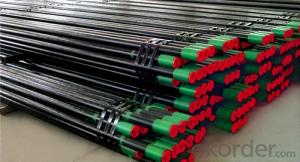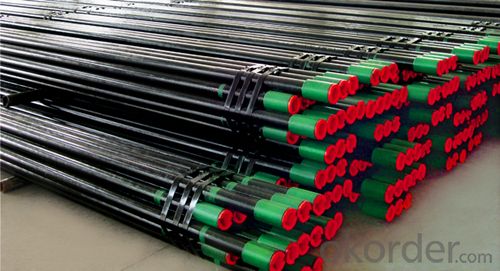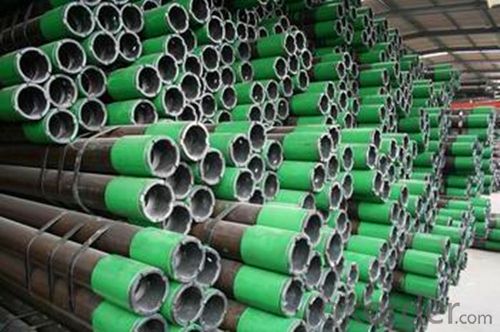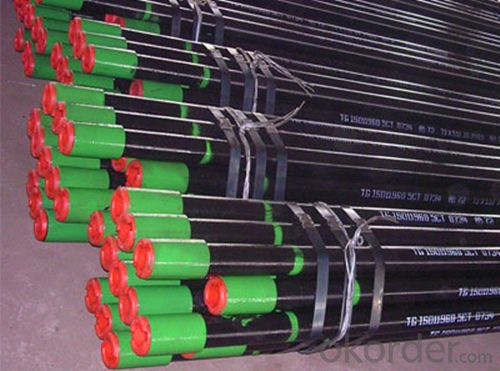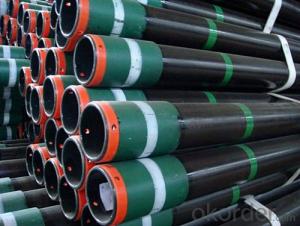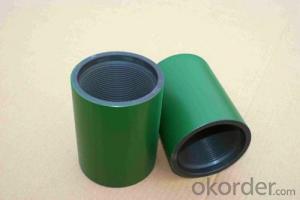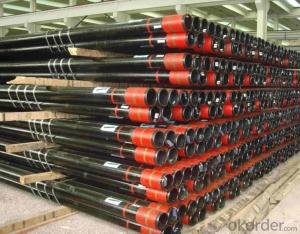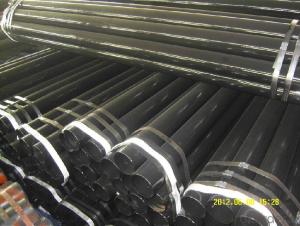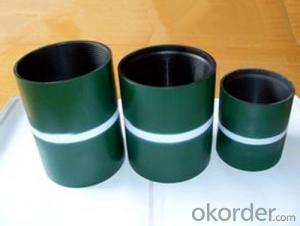Tubing Pipe of Grade J55 with API Standard
- Loading Port:
- Qingdao
- Payment Terms:
- TT OR LC
- Min Order Qty:
- 20 m.t.
- Supply Capability:
- 2000 m.t./month
OKorder Service Pledge
OKorder Financial Service
You Might Also Like
1. Structure of Tubing Pipe of Grade J55 Description
API 5CT Steel Pipe, J55 Oil/Petroleum tubing Pipe, OCTG
1) Size: O.D. 1.900", 2-3/8", 2-7/8", 3-1/2", 4-1/2"
2) Grade: J55
3) Wall thickness: 3.18 - 10.54mm
4) Length: R1,R2,R3
5) Thread: 8RD and 10RD
6) All our Tubing accord with API SPEC 5CT standard.
2. Main Features of Tubing Pipe of Grade J55
1) Advanced test for quality
2) MTC, COC provided
3) Supervision is welcome
3. Tubing Pipe of Grade J55 Images
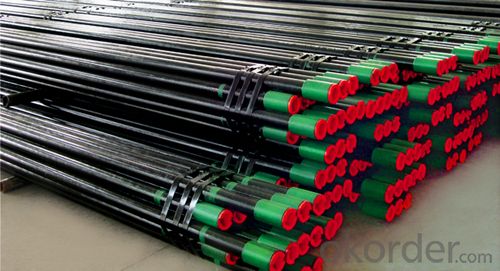
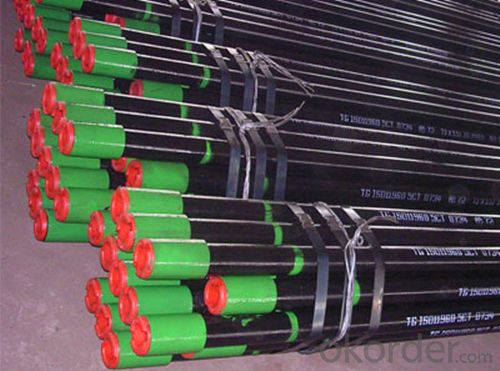
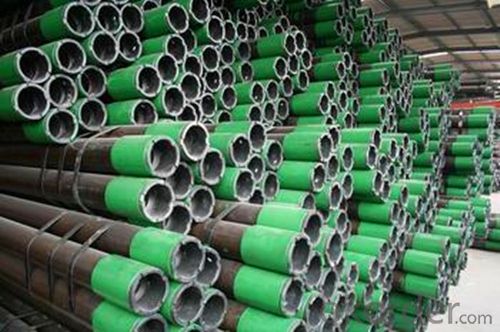
4. Tubing Pipe of Grade J55 Specification
Size Destination | Weight Destination | Outside Diameter | Wall Thickness | Type of End Finish | ||||||||
Grade | ||||||||||||
T&C Non-Upset | T&C External Upset | in | mm | in | mm | J55 K55 | L80 | N80 | C90 | T95 | P110 | |
1.900 | 2.40 | - | 1.900 | 48.26 | 0.125 | 3.18 | PI | - | - | - | - | - |
2.75 | 2.90 | 0.145 | 3.68 | PNUI | PNUI | PNUI | PNUI | PNUI | - | |||
3.65 | 3.73 | 0.200 | 5.08 | PU | PU | PU | PU | PU | PU | |||
4.42 | - | 0.250 | 6.35 | - | P | - | P | P | - | |||
5.15 | - | 0.300 | 7.62 | - | P | - | P | P | - | |||
2 3/8 | 4.00 | - | 2.375 | 60.3 | 0.167 | 4.24 | PN | PN | PN | PN | PN | - |
4.00 | 4.70 | 0.190 | 4.83 | PNU | PNU | PNU | PNU | PNU | PNU | |||
5.80 | 5.95 | 0.254 | 6.45 | - | PNU | PNU | PNU | PNU | PNU | |||
6.60 | - | 0.259 | 7.49 | P | P | P | P | P | - | |||
7.35 | 7.45 | 0.336 | 8.53 | PU | PU | PU | PU | PU | - | |||
2 7/8 | 6.40 | 6.50 | 2.875 | 73.02 | 0.217 | 5.51 | PNU | PNU | PNU | PNU | PNU | PNU |
7.80 | 7.90 | 0.276 | 7.01 | - | PNU | PNU | PNU | PNU | PNU | |||
8.60 | 8.70 | 0.308 | 7.82 | - | PNU | PNU | PNU | PNU | PNU | |||
9.35 | 9.45 | 0.340 | 8.64 | - | PU | - | PU | PU | - | |||
10.50 | - | 0.392 | 9.96 | - | P | - | P | P | - | |||
11.50 | - | 0.440 | 11.18 | - | P | - | P | P | - | |||
3 1/2 | 7.70 | - | 3.500 | 88.9 | 0.216 | 5.49 | PN | PN | PN | PN | PN | - |
9.20 | 9.30 | 0.254 | 6.45 | PUN | PUN | PUN | PNU | PNU | PUN | |||
10.20 | - | 0.289 | 7.34 | PN | PN | PN | PN | PN | - | |||
12.70 | 12.95 | 0.375 | 9.53 | - | PUN | PUN | PNU | PNU | PUN | |||
14.30 | - | 0.430 | 10.92 | - | P | - | P | P | - | |||
15.50 | - | 0.476 | 12.00 | - | P | - | P | P | - | |||
17.00 | - | 0.530 | 13.46 | - | P | - | P | P | - | |||
4 | 9.50 | - | 4.00 | 101.6 | 0.226 | 5.74 | PN | PN | PN | PN | PN | PN |
10.70 | 11.00 | 0.262 | 6.65 | PU | PU | PU | PU | PU | PU | |||
4 1/2 | 12.60 | 12.75 | 4.500 | 114.3 | 0.271 | 6.88 | PNU | PNU | PNU | PNU | PNU | - |
15.20 | - | 0.337 | 8.56 | - | P | - | P | P | - | |||
17.00 | - | 0.380 | 9.65 | - | P | - | P | P | - | |||
18.90 | - | 0.430 | 10.92 | - | P | - | P | P | - | |||
21.50 | - | 0.500 | 12.70 | - | P | - | P | P | - | |||
23.70 | - | 0.560 | 14.22 | - | P | - | P | P | - | |||
26.10 | - | 0.630 | 16.00 | - | P | - | P | P | - | |||
5. FAQ of Tubing Pipe of Grade J55
We have organized several common questions for our clients,may help you sincerely:
①How about your company?
One of the leading manufacturers and suppliers specializing in steel pipe products in China, mainly offering four series steel pipes including welded steel pipe (ERW, SSAW, LSAW and square and rectangle pipe), seamless steel pipe, hot dipped galvanized steel pipe and steel pipe with 3 layer polythene coating. We can provide customers different specification standards e.g. ASTM A53, ASTM A106, BS1387, API 5L, API 5CT, ISO3183 and etc. Our scope of supplying covers from 1/2" to 48" for the outside diameter of welded pipes, and 1/8" to 20" for the seamless pipes.
Other than steel pipes we are also capable of supplying a wide variety of pipeline accessories, steel pipe fittings; valves etc. consists of our one-stop sales. The integrated sales & service ensures customers with various demands an easier access for purchasing management.
②How to guarantee the quality of the products?
We have established the international advanced quality management system,every link from raw material to final product we have strict quality test;We resolutely put an end to unqualified products flowing into the market. At the same time, we will provide necessary follow-up service assurance.
③How long can we receive the product after purchase?
In the purchase of product within three working days, We will arrange the factory delivery as soon as possible.
- Q: What type of steel pipe dance is used in general?
- According to international competition practice, the standard size of steel tube is 40 mm or 45 mm in diameter, and the 45mm is usually used. The height of the steel pipe is not less than 3.3 meters and not higher than 4 meters.
- Q: What are the different methods of repairing damaged steel pipes?
- There are several methods of repairing damaged steel pipes, including welding, epoxy lining, pipe bursting, and pipe relining. Welding involves joining the damaged sections of the pipe together using heat, while epoxy lining involves applying a protective coating to the inner surface of the pipe. Pipe bursting involves replacing the damaged pipe with a new one by pulling it through the existing pipe, and pipe relining involves inserting a new liner into the damaged pipe to create a new, seamless pipe within the existing one. The choice of method depends on factors such as the extent of damage, accessibility, and cost-effectiveness.
- Q: How do you determine the required wall thickness for steel pipes?
- The required wall thickness for steel pipes is determined through various factors and calculations. One of the primary considerations is the pressure that the pipe will be subjected to. The higher the pressure, the thicker the wall needs to be to ensure the pipe can withstand the internal forces. Another important factor is the material strength of the steel used for the pipe. Different grades of steel have varying tensile strengths, which affect the required wall thickness. The tensile strength is the maximum amount of stress a material can withstand before it fails, so it is crucial to select a steel grade that can handle the expected pressure. Additionally, the pipe's diameter plays a role in determining the required wall thickness. Larger diameter pipes generally require thicker walls to maintain structural integrity and prevent deformation under pressure. To calculate the required wall thickness, engineers use industry standards and formulas. The most commonly used standard is the American Society of Mechanical Engineers (ASME) B31 code, which provides guidelines for designing pressure piping systems. The ASME code incorporates factors such as safety margins, material properties, and pressure ratings to determine the appropriate wall thickness. Furthermore, other considerations such as temperature, corrosion, and external loads may also influence the required wall thickness. For example, high-temperature applications may require thicker walls to prevent the pipe from buckling or becoming too soft. In summary, determining the required wall thickness for steel pipes involves considering factors such as pressure, material strength, diameter, temperature, and other external forces. Engineers rely on industry standards and calculations to ensure the pipe can withstand the intended operating conditions safely.
- Q: How to descaling galvanized steel pipe?
- If the substrate is rusty, rust removal can be removed by acid leaching. If the coating is rusted, it can also be dipped in acid, but this will also remove the coating and make the base material more susceptible to rust, preferably by re plating and passivation
- Q: What are the different grades of steel pipes?
- There are several different grades of steel pipes, including carbon steel, stainless steel, and alloy steel. Each grade has its own unique properties and is used for specific applications based on factors such as strength, corrosion resistance, and temperature resistance.
- Q: What are the common standards for coating and lining of steel pipes?
- The common standards for coating and lining of steel pipes are outlined by various organizations and regulatory bodies to ensure the durability, corrosion resistance, and overall quality of the pipes. Some of the widely recognized and used standards include: 1. American Society for Testing and Materials (ASTM): ASTM has developed numerous standards for coating and lining of steel pipes, such as ASTM A775/A775M for epoxy-coated reinforcing steel, ASTM A1064/A1064M for metallic-coated steel wire, and ASTM A1057/A1057M for fusion-bonded epoxy-coated steel reinforcement. 2. American Water Works Association (AWWA): AWWA has established several standards for coating and lining of steel pipes used in the water industry. Examples include AWWA C210 for liquid epoxy coating systems for the interior and exterior of steel water pipelines, and AWWA C213 for fusion-bonded epoxy coating for the interior and exterior of steel water pipelines. 3. National Association of Corrosion Engineers (NACE): NACE International develops standards and recommended practices for the corrosion control of steel pipes. NACE SP0169 provides guidelines for selection and application of coatings for underground or submerged steel pipelines, while NACE SP0198 offers recommendations for external coatings of steel pipelines. 4. ISO Standards: The International Organization for Standardization (ISO) has developed various standards related to coating and lining of steel pipes. ISO 21809-1 specifies the requirements for external coatings applied to buried or submerged pipelines, while ISO 21809-2 focuses on the internal coating and lining of such pipelines. These standards cover different aspects of the coating and lining process, including surface preparation, application methods, minimum coating thickness, adhesion, and quality control. Adhering to these standards ensures that steel pipes are properly protected against corrosion, abrasion, and other forms of deterioration, leading to longer service life and enhanced performance in various industries such as oil and gas, water supply, and infrastructure.
- Q: Can steel pipes be used for drinking water supply?
- Yes, steel pipes can be used for drinking water supply. However, it is important to ensure that the pipes are properly coated or lined to prevent corrosion and any potential contamination of the water. Regular maintenance and monitoring are also necessary to ensure the pipes remain in good condition for safe drinking water supply.
- Q: Are steel pipes recyclable?
- Yes, steel pipes are recyclable.
- Q: How are steel pipes used in the manufacturing of geothermal systems?
- Steel pipes are used in the manufacturing of geothermal systems for their durability and heat conductivity. They are used to transport fluids, such as water or steam, between the geothermal source and the heat pump or power generator. Steel pipes can withstand high temperatures and pressures, making them ideal for the harsh environment of geothermal systems. Additionally, their corrosion resistance ensures the longevity and efficiency of the system.
- Q: How are steel pipes used in the construction of power transmission lines?
- Steel pipes are commonly used in the construction of power transmission lines as they provide a strong and durable structure to support the weight of the lines and withstand environmental conditions. These pipes serve as the main support structure for overhead power lines and are often used to elevate the lines above ground level or across bodies of water. Additionally, steel pipes are used to protect and encase underground power cables, ensuring their safety and longevity.
Send your message to us
Tubing Pipe of Grade J55 with API Standard
- Loading Port:
- Qingdao
- Payment Terms:
- TT OR LC
- Min Order Qty:
- 20 m.t.
- Supply Capability:
- 2000 m.t./month
OKorder Service Pledge
OKorder Financial Service
Similar products
Hot products
Hot Searches
Related keywords
